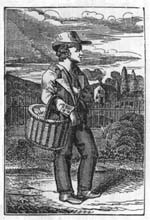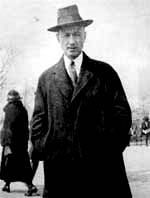History of Rollo
Record Company Rejection Letters

Origin and Significance

Rollo emerged as one of the most popular children's book characters in the decades preceding the American Civil War, a creation of author Jacob Abbott (1803-1879) in 1835. The American composer Charles Ives (1874-1954) used "Rollo" as a short-hand for musical complacency. Rollo was, according to John Kirkpatrick, "a good little boy with an inquiring nature, and the more he has to have everthing explained to him in great detail, the more information could be packed into each Rollo book. For Ives he became a symbol of the literal mind unable to imagine anything beyond what he'd been taught." Or, as Henry and Sidney Cowell put it, Rollo was for Ives "one of those white-livered weaklings who cannot stand up and receive the full force of a dissonance like a man."
Ives used Rollo, in particular, to stand for those music critics unable or unwilling to comprehend his music. For example, he states in his Memos: "Every so often, an article or a clipping or a 'verbal massage' is sent to a man (see name on dotted line), which shows that Rollo has a job, writing his opinion about things the facts of which he doesn't know and doesn't try to know. If he can't hear and doesn't know it, he's a mental-musico-defective (from the neck up) - if he doesn't try to hear and knows he doesn't know, then he is getting money under false pretenses! In other words, these commercial pansies are either stupid or they are liars."
What, then, is the significance of the name "Rollo," now re-appropriated by the rock band? In answering this question, two things are immediately clear: first, the band identifies either with "Little Rollo Holiday," Abbott's inquisitive 19th-century child character, or with the idea of unadventurous, normative, and harmonic music for which Ives's Rollo served as spokesman. Even a cursory examination of the band's newly-released CD, "Don't Look," confirms the latter hypothesis, though the assertion of an underlying empathy with Abbott's character cannot be proved conclusively at this point.
Second, the appropriation of the name, "Rollo," given its relative obscurity within conventional "pop" and "rock" circles, and its simultaneous notoriety within the world of avant-garde or academic music, signifies an unmistakable ambivalence by the band, Rollo, towards the production of music within the pop-rock genre. For by their having adopted a name which, on its surface, represents musical convention and complacency but which, by virtue of its obscure relation to the development of modern 20th-century musical forms, evidences an interest in precisely the opposite type of musical taste, one can only conclude that both attitudes are, if not somehow explicit within the band psyche, at least marginally available within band members' CD collections.

There is one other fascinating connection worth noting between Rollo—the band—and Charles Ives. J. Peter Burkholder, though writing about Ives in 1985, might just as well have been describing the band when he states: "No other composer had inaugurated his career in the public eye only after finishing most of his music, including all of his major works, in virtually complete isolation. No other composer had introduced himself to the musical public by publishing on his own what would eventually become recognized as his masterpiece by sending it out virtually at random to friends, performing musicians, composers, teachers, critics, conservatories and schools of music, publishers, and the musical press. And no other composer had been so concerned with the ideas behind the music that he insisted on accompanying his music with a program note at least as long and as difficult to understand as the music it attempted to explain."
References:
Burkholder, J. Peter, Charles Ives: The Ideas Behind the Music, Yale University Press. (New Haven and London: 1985)
Cowell, Henry and and Cowell, Sidney, Charles Ives and His Music, Oxford University Press (London, Oxford, New York: 1955, 1969)
Ives, Charles, Charles E. Ives: Memos, Kirkpatrick, John, ed., W.W.Norton & Co.,Inc. (New York: 1972)
Other Useful Links:
The Charles Ives Society, Inc. homepage (includes biography of Ives)© 2007-2015 Rollo (Ochshorn, Smullyan, Ochshorn). All rights reserved.
Republishing material on this web site, whether in print or on another web site, in whole or in part, is not permitted without advance permission of Rollo.
Last updated 23 July, 2015